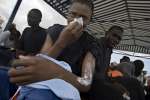UNHCR to expand confidence-building programme for Sahrawi refugees
News Stories, 15 September 2009
GENEVA, September 15 (UNHCR) – UN High Commissioner for Refugees António Guterres wrapped up a tour of North Africa at the weekend after securing agreement to expand confidence-building measures for Sahrawi refugees from Western Sahara. He also met some of the Sahrawi refugees in south-western Algeria and discussed asylum issues with Moroccan and Algerian leaders.
The five-day visit began in Algeria last Tuesday and then took Guterres to Morocco and Western Sahara. During his trip, leaders of Algeria, Morocco and the Sahrawis agreed to the proposal to boost the current modest, yet important, Confidence-Building Measures Programme launched by UNHCR in 2004 for the Sahrawis from Western Sahara.
The programme includes family visits and telephone services – aimed at connecting Sahrawi refugees in camps in Algeria's arid Tindouf region and their relatives in the Western Sahara. As of last July, more than 8,750 people had benefitted out of some 41,000 applicants for family visits.
The different parties agreed to take up a UNHCR proposal to allow people to travel overland, rather than by air only, for family visits. Using the most direct road route, via Mahbas, to destination cities in Western Sahara would allow a lot more people to visit their families – some 4,400 a year compared to the 2,000 a year who have benefitted from the air programme.
UNHCR argued that the main benefit would be humanitarian, bringing families together after long periods of separation.
Sahrawi refugees started arriving in Algeria in 1976 after Spain withdrew from the Western Sahara and fighting broke out over its control. Many of the Sahrawi refugees in Algeria have been living in the Tindouf camps for more than 30 years.
Guterres said UNHCR could not solve the problems of the Sahrawis as this was a political issue. "Exile is like pneumonia, you need antibiotics to treat it. In this case, the antibiotics are the political solution. I cannot offer them. I only have aspirin to relieve some of the pain," he said.
While on mission, Guterres became only the second UN High Commissioner for Refugees to travel to Tindouf and meet Sahrawi refugees. He listened eagerly to the tales of hardship and said it was important to draw the attention of the international community to their needs.
During his visit to Western Sahara, Guterres met a group of 33 Sahrawi refugees who had just been flown in from Algeria by the UN mission in Western Shara for a family visit. One woman told him she was going to see her father for the first time in her life – her parents were separated by conflict before she was born. As her party arrived another group of 35 Sahrawis flew to Algeria to meet refugee relatives in the camps.
Meanwhile, during his meetings with senior officials in Algeria and Morocco, including the prime ministers of both countries, Guterres encouraged both governments to establish well-functioning asylum systems that can detect people in need of international protection within mixed migration flows.
He told donor representatives in both Rabat and Algiers that it was important for the international community to continue to provide sustained support, as the Sahrawi refugee issue had slipped off the radar in recent years.
Guterres' visit came during the Islamic fasting month of Ramadan and he said this was no coincidence. The High Commissioner said he wanted to express solidarity with Muslim refugees and host countries during this special period.
By Reem Alsalem in Geneva















































